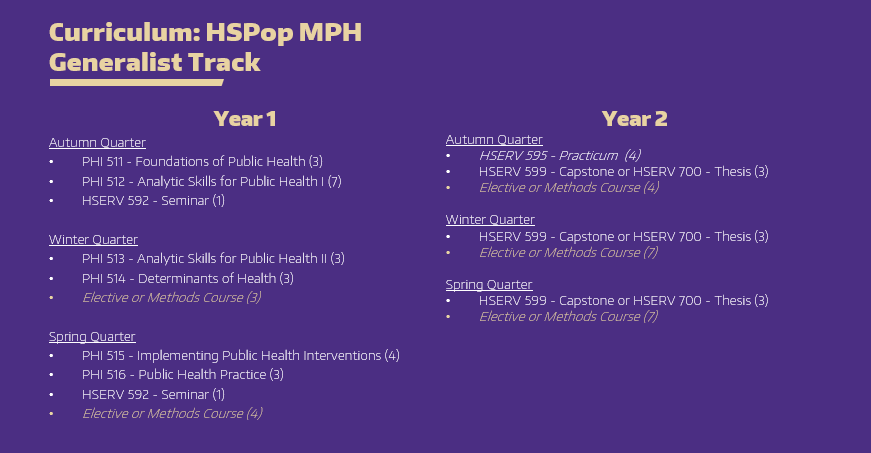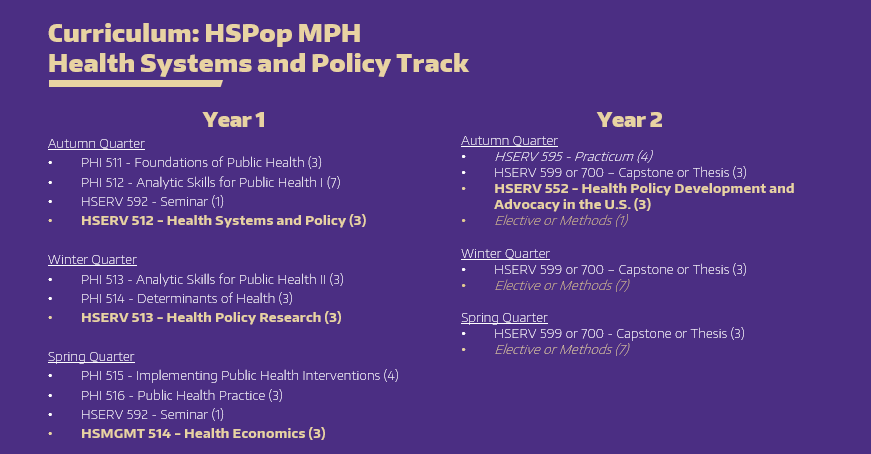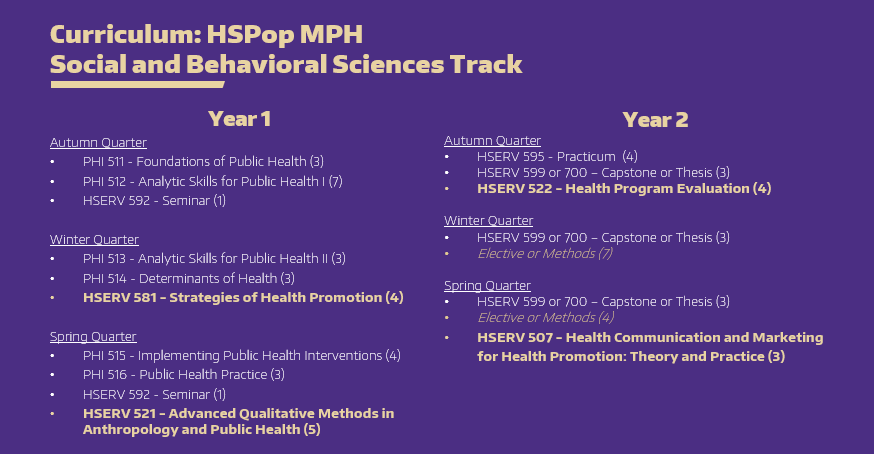The UW HSPop MPH program offers exceptional instruction in public health practice and research methods, health care systems, health economics, health promotion, and the social determinants of health.
In U.S. News & World Report’s 2025 program and specialty rankings:
- Social and Behavioral Sciences ranked #12 (tie)
- Health Systems and Policy ranked #13 (Health Policy and Management category)
- The UW ranked #10 in graduate schools of public health
Prospective students should apply to ONLY ONE of our three concentrations.
Though applicants may apply to as many UW MPH programs in a given application cycle as they like, the following concentrations are all part of one MPH program, with a shared admissions committee. So please don’t apply to more than one concentration.
Once admitted, students may switch concentrations no later than the last day of winter quarter in the first year of the program. Prospective students are welcome to contact faculty representatives of the concentrations regarding current research activities and opportunities.
Substitutions or waivers of the concentration requirements can be made with the approval of the concentration faculty lead. Waivers or substitutions for required core courses are rare and require pre-approval.
Concentrations
HSPop MPH students in all three tracks take the same required public health interdisciplinary and seminar courses before going on to take their required concentration courses and electives.
Below are the requirements for each HSPop MPH concentration.

Generalist Concentration
Faculty Lead: Clarence Spigner (he/him), DrPH, MPH
The Generalist is the most flexible track in the HSPop MPH program, offering five electives or methods courses. After completing the required PHI and HSERV courses, students in the Generalist concentration are free to tailor their elective or methods courses to suit their interests.
Applicants who feel drawn to one of the other two concentrations but wish for more flexibility may choose the Generalist track, and then use the required course list from HSP or SBS as a guide as they select their electives.
Elective and Methods Courses
Generalist concentration students complete five electives or methods courses, for a total of 23 credits.
Methods Courses
HSERV 517: Qualitative Research Methods for Health Systems and Population Health
Builds on introductory training in qualitative research methods by diving deeper into different frameworks, study designs, sampling approaches, and data collections tools. Covers various data analytic approaches, as well as data visualization, interpretation, writing and presenting qualitative research findings. Students learn to apply these concepts and execute a qualitative research project from start to finish.
3 credits
SBS Required Course
HSERV 513: Health Policy Research
Extends students’ understanding of the nature of health policy and health policy development in the context of a market-based economy.
3 credits
HSP Required Course
HSERV 522: Health Program Evaluation
Focuses on the use of evaluations within health programs. Discusses how program evaluations utilize research methods to answer questions concerning efficacy, implementation, and drivers of changes in health. It also looks at the reasons for creating program evaluations — the drivers of evaluation, how results can be transformed into action, and the role of equity in formulating and implementing evaluation results.
4 credits
SBS Required Course
HSERV 527: Survey Research Methods
Provides students with skills in questionnaire development and survey methods. Students develop a questionnaire and design a survey research proposal on a health-related or social topic.
4 credits
HSERV 548: Research Methods of Social and Contextual Determinants of Health
Explores study-design, measurement, analytic, and interpretation issues applicable to research on social and contextual determinants of health and health disparities. This lecture/seminar course is offered to graduate students with knowledge of epidemiologic and biostatistical principles who are interested in understanding complex relationships between social/contextual factors and health.
3 credits
HSERV 584: Assessing Outcomes in Health and Medicine
Concepts and methods for developing and using patient-reported outcomes in health and medicine. Emphasis on patient self-reported health status and quality of life. Qualitative research and psychometric methods applied to health outcomes assessment and all applications.
3 credits
HSERV 523: Advanced Health Services Research Methods I – Large Public Databases; Big Data
Introduces the new big data of health services research, health claims, and survey databases. Discusses the promises and pitfalls of the data and models for analyzing the correlates of health care costs and utilization.
4-5 credits
HSERV 524: Advanced Health Services Research Methods II – Hierarchical and Incomplete Data
Introduces advanced biostatistical techniques for analyzing incomplete data in population health research. Examines a wide range of topics including: missing data and potential outcome framework for causal inference, propensity score and multiple imputation, multilevel random effect linear and logistic models, and empirical Bayes prediction.
4-5 credits
HSERV 525: Advanced Health Services Research Methods III – Casual Inference Using Observational Data
Focuses on reviewing statistical methods developed for “micro” (individual-level) data on behavior (choices or exposures) and outcomes in order to make causal inference about the role of a choice or an exposure on outcomes.
4-5 credits
HSERV 589: Community Based Participatory Research and Health
Begins with a research topic of importance to the community with the aim of combining knowledge and action for social change. Provides an understanding of principles and strategies, and appreciate of its advantages and limitations, and skills for participating effectively.
3 credits
Elective Courses
HSERV 507: Health Communication and Marketing for Health Promotion: Theory and Practice
Provides an introduction to the field of health communication and social marketing. Focuses on how persuasive communication and marketing are most effectively used to improve population health and reduce inequities. Students develop and present a health communication campaign proposal.
3 credits
SBS Required Course
HSERV 509: Public Health Informatics
Introduction to the emerging field of public health informatics. Covers general public health topics as well as key public health informatics issues and applications. Evaluates a public health information system.
3 credits
HSERV 511: Introduction to Health Services and Public Health
History, organization, and effectiveness of U.S. healthcare and public health systems. Determinants of health, need, and utilization. Public and private financing. Supply and provision of personal and public health services. Managed care. Government and private sector roles.
3-4 credits
HSERV 512: Health Systems and Policy
Students review and examine selected topics from literature. Includes need and access to care; theory and effects of health insurance; private and public insurance programs; managed care; costs/expenditures; availability and organization of health resources; and quality assessment and improvement.
3 credits
HSP Required Course
HSERV 514: Social Determinants of Population Health and Health Disparities
Explores the elements and actions of a population health approach, including conceptualizing the determinants of health, synthesizing knowledge about major social determinants, and applying knowledge to improve population health and reduce health disparities.
3 credits
HSERV 515: War and Health
Explores the health consequences of war (injury, infectious diseases, mental health, chronic disease, malnutrition, infrastructure) and the role of health professionals and others in preventing war (advocacy, measurement and application of epidemiology methods, promotion of social equity).
5 credits
HSERV 542: Epidemiology of Maternal and Child Health Problems
Contributions to understanding and prevention of major maternal and child health problems, including pregnancy outcome, infant and child morbidity and mortality, maternal morbidity and mortality, abnormal child growth and development, and early-life factors in adult health problems.
3-4 credits
HSERV 544: Maternal & Child Health in Developing Countries
Emphasizes critical health problems of women and children in developing countries in social, economic, and cultural contexts. Practical approaches to developing MCH programs shared via lecture/discussions, exercises, and small group work. Students acquire skills in baseline assessment, setting objectives, planning and evaluating interventions, and involving communities.
3 credits
HSERV 551: Public Health Law
Focuses on the role of law in public health administration and in the increasingly regulated healthcare industry. Provides a foundation in the relevant law for public health officers and healthcare industry administrators.
2 credits
HSERV 553: Health Policy Development and Advocacy in the United States
Practice-oriented course designed to enhance knowledge and cultivate skills for U.S. health policy development. Students learn effective policy analysis, research, and communications skills.
4 credits
HSP Required Course
HSERV 554: Homelessness: Destitute Poverty in the Emerald City
Covers the landscape and types of homelessness in Seattle and beyond. Topics include: causes and health consequences of homelessness, the role of destitute poverty in the loss of housing stability, history and politics of homelessness in Seattle, the effects of COVID-19 on homeless policy, hearing the voices of the unhoused, activism, shaming and saviorism, and solutions, big and small.
1-3 credits (max. 3)
HSERV 555: Health Disparities
Focuses on health disparities and health inequity in the United States. Course will cover both theoretical and empirical approaches to understanding patterns of health across social groups, with a focus on designing research and public health programs to addressing health disparities.
2 credits
HSERV 573: Topics in Indigenous Health
Covers the fundamentals of Indigenous health, including Indigenous conceptual frameworks specific to health, wellness, and resilience. Topics include Indigenous social determinants of health, Federal Indian health policy, and American Indian and Alaska Native trends in population health outcomes within the context of the socio-ecological model.
2-3 credits
HSERV 581: Strategies of Health Promotion
Assessment of health promotion planning, implementation, and evaluation strategies for their strengths, weaknesses, and effectiveness. Students critique strategies to modify behavioral factors that influence lifestyles of individuals, including decisions influencing their reciprocal relationship with environmental factors affecting the health of individuals, organizations, and communities.
4 credits
SBS Required Course
HSMGMT 514: Health Economics
Uses economic concepts and tools to examine range of issues pertaining to healthcare, delivery of healthcare services. Includes demand analysis, production of health services, expenditure growth, markets for hospital and physician services, externalities. Emphasis on using economics to examine issues and solve problems.
3 credits
HSERV 579: Structural Racism and Public Health
Introduces the concept of institutional racism and ways structural racism undermines public health. Discusses history of racism and intersections between structural racism and other systems of oppression. Explores relationship to racism and ways internalized racism acts as a barrier to health equity. Considers public health practitioners’ role in addressing racism.
1 credit
HSERV 587: Health Policy Economics
Applies economic theory to selected topics in healthcare, including information, risk and insurance, industry organization, government regulation, and public health issues. Emphasizes policy implications of these applications.
3 credits

Health Systems and Policy Concentration
Faculty Lead: Molly Firth (she/her), MPH
The Health Systems and Policy (HSP) concentration is for students who seek a career of leadership in public or private efforts to improve the performance of the health system.
Students who complete the concentration will be well grounded in core competency areas of public policy development, health economics, law, and ethics.
In addition, HSP students will have a solid foundation in key analytic disciplines including biostatistics, epidemiology and qualitative methods. They can also acquire a deep understanding of how and where public policy is developed, what forms it takes, the relevant actors and institutions, and the economic and legal forces that affect and are affected by public policy.
Most HSP students choose a capstone project as their culminating project, though they also have the option to choose a thesis project.
HSP Concentration Required Courses
- HSERV 512: Health Systems and Policy – Students review and examine selected topics from literature. Includes need and access to care; theory and effects of health insurance; private and public insurance programs; managed care; costs/expenditures; availability and organization of health resources; and quality assessment and improvement.
3 credits - HSERV 513: Health Policy Research – Extends students’ understanding of the nature of health policy and health policy development in the context of a market-based economy.
3 credits - HSMGMT 514: Health Economics – Uses economic concepts and tools to examine range of issues pertaining to healthcare, delivery of healthcare services. Includes demand analysis, production of health services, expenditure growth, markets for hospital and physician services, externalities. Emphasis on using economics to examine issues and solve problems. Prior economics courses not required.
4 credits - HSERV 553: Health Policy Development and Advocacy in the United States – Practice-oriented course designed to enhance knowledge and cultivate skills for U.S. health policy development. Students learn effective policy analysis, research, and communications skills.
3 credits - +3 electives or methods courses (~15 credits). See electives and methods listed under the Generalist concentration.

Social and Behavioral Sciences Concentration
Faculty Lead: Miruna Buta (she/her), PHD, MA
The Social and Behavioral Sciences (SBS) concentration is for students who wish to apply social and behavioral sciences theory and methods to the study, practice, and thought of public health. Survey research, statistics, behavioral measurement, ethnography, quality-of-life assessment, community-based participatory research, and cost-effectiveness analysis are highlighted.
The focus of the concentration is on research and application of knowledge concerning the relationships among:
- Social, cultural, and behavioral processes
- Health and illness
- What society does and can do to promote health and prevent illness
Graduates who complete the concentration will have the background and skills to pursue careers in research or public health practice.
SBS Concentration Required Courses
- HSERV 581: Strategies of Health Promotion – Assessment of health promotion planning, implementation, and evaluation strategies for their strengths, weaknesses, and effectiveness. Students critique strategies to modify behavioral factors that influence lifestyles of individuals, including decisions influencing their reciprocal relationship with environmental factors affecting the health of individuals, organizations, and communities.
4 credits - HSERV 517: Qualitative Research Methods – Builds on introductory training in qualitative research methods by diving deeper into different frameworks, study designs, sampling approaches, and data collections tools. Covers various data analytic approaches, as well as data visualization, interpretation, writing and presenting qualitative research findings. Students learn to apply these concepts and execute a qualitative research project from start to finish.
3 credits - HSERV 522: Health Program Evaluation – Focuses on the use of evaluations within health programs. Discusses how program evaluations utilize research methods to answer questions concerning efficacy, implementation, and drivers of changes in health. It also looks at the reasons for creating program evaluations — the drivers of evaluation, how results can be transformed into action, and the role of equity in formulating and implementing evaluation results.
4 credits - HSERV 507: Health Communication and Marketing for Health Promotion: Theory and Practice – Provides an introduction to the field of health communication and social marketing. Focuses on how persuasive communication and marketing are most effectively used to improve population health and reduce inequities. Students develop and present a health communication campaign proposal.
3 credits - +2 electives or methods courses (~11 credits). See electives and methods courses listed under the Generalist concentration.
Sample schedule
Scroll through for each concentration.



